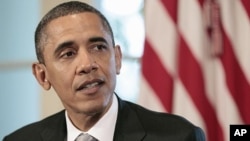In U.S. politics, growing concern over the state of the domestic economy is beginning to cast a shadow over President Barack Obama’s re-election prospects next year.
There was a bit of good economic news Friday with a slight drop in the U.S. jobless rate down to 9.1 percent, but it came one day after a massive dip in the stock market.
Opinion polls show the public is increasingly worried about the economy and pessimistic about the future of the country with 15 months to go before the 2012 presidential election.
President Obama welcomed the latest small uptick in employment but also cautioned that the U.S. has a long way to go to recover the eight million jobs lost in the recession since 2008.
“But what I want the American people and our partners around the world to know is this - we are going to get through this," he said. "Things will get better and we are going to get there together.”
Political experts say the state of the economy will be the crucial factor in next year’s presidential race. They also say that the continuing high unemployment, weak economic growth and stock market volatility are all cause for concern for the president and his supporters.
“There is still some hope and some time for the economy to improve, but if it is the same level of unemployment, the same lack of prospects and the future doesn’t look so bright, that is very tough position for a president no matter who the opposition is,” said John Fortier, who monitors U.S. politics at the Bipartisan Policy Center in Washington.
Mr. Obama’s approval rating has slipped in the polls of late and that has encouraged the dozen or so Republicans who are preparing to battle it out for their party’s presidential nomination next year.
Presidential elections are usually a referendum on the incumbent, and Republican Senator Lamar Alexander of Tennessee says there is little mystery about his party’s plan of attack in next year’s election.
“We don’t blame the president for the problems he has inherited," he said. "But we do hold him responsible for making the economy worse.”
The president hopes to gain politically from the recent compromise agreement to raise the debt ceiling in exchange for cuts in government spending, especially with centrist voters looking for the two parties to compromise to reduce the budget deficit.
But many Democrats were disheartened by the compromise, feeling the president gave away too much when tax hikes for the wealthy were taken off the bargaining table.
“The Republicans with less than 15 months to go are determined to do everything they can to deny him any victories and they were emboldened by this debate over the debt crisis because that was great leverage for them,” said Tom DeFrank, Washington bureau chief for the New York Daily News.
The latest New York Times/CBS News poll suggests neither side came off well in the debt ceiling clash.
Analyst Rhodes Cook says that includes the conservative grassroots Tea Party movement, which helped elect dozens of new Republican lawmakers last year.
“I think the Republicans could overplay their hand on some of these issues," he said. "I’m not sure that support for the Tea Party is as widespread as the tea partiers think. I wouldn’t bet against Obama and the Democrats still having a good year in 2012.”
If the high unemployment and low economic growth persist, many experts predict that President Obama will face an uphill climb to re-election next year.
Democratic strategist Mark Penn says the president may have to make the argument that as bad as things are, they could be worse if he is defeated.
“And so the question he has got to put is, ‘Don’t you want to continue these policies? Can you risk going back to the Republicans and the policies of Bush when those policies are the ones that are being held responsible for the debt crisis and the economic crisis in the first place?’”
The race for the Republican presidential nomination heats up next week in the early contest state of Iowa, where several contenders will compete in a straw poll or test vote that measures early support among Republican voters, especially social conservatives.
Worsening US Economy Threatens Obama's Re-Election Prospects
- By Jim Malone





